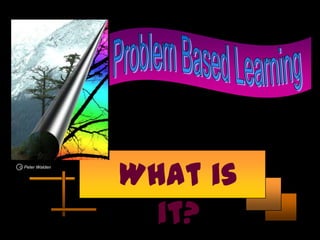
What is problem based learning
- 1. What is c Peter Walden it?
- 2. What is PBL? ? Problem-based learning can be described very broadly as learning that is centred around `a problem, a query or a puzzle that the learner wishes to solve' (Boud 1985: 13). The term ‘problem based learning’ is usually used to describe a curriculum approach which is problem centred rather than discipline centred. http://www.csd.uwa.edu.au//newsletter/issue0496/pbl.html Boud, D J (1985) Problem-based learning in perspective, in Boud, D J (ed) Problem-Based Learning in Education for the Professions. Sydney: Higher Education Research and Development Society of Australasia.
- 3. What is PBL? Where Did It Come From? PBL originated in medical schools in the USA in the 1950s and was developed to improve the quality of medical education. What Is It ? • PBL is student-centred. • Students actively participate in their own learning. • Students set many of their own goals so have ownership of their learning. • Students play an active role in solving problems. • Students work in groups to solve ‘real-world’ type problems. • The teacher is a coach, guide, co-investigator and evaluator.
- 4. Characteristics of PBL • Uses real world problems that are relevant and authentic. • Students learn content and critical thinking skills while dealing with the problems. • Problems are ill-structured. PBL provides opportunities for students to develop a range of skills. Information skills Problem solving skills Communication skills PBL Thinking skills develops Computing skills Teamwork skills Time management skills
- 5. The PBL Process A Simplified Model 1. Meet the situation 2. Analyse the situation 3. Define the problem 4. Gather and share information 5. Refine the problem statement 6. Generate responses to the situation 7. Evaluate responses to situation 8. Reflect and evaluate performance c Peter Walden
- 6. Why choose PBL? c Peter Walden There are a wide variety of learning models, and much debate as to which is the ‘best’ one to use when developing curriculum or learning activities. It has become widely accepted that there is no particular model that is the ‘best’ but rather it is more appropriate to utilise a range of models that best suit the learner’s needs. PBL is one model that serves the needs of many students, challenges them, and allows them to develop the skills to facilitate life long learning.
- 7. Why choose PBL? "I was good at everything -- honest, everything! -- until I started being here with you [in school]. I was good at laughing, playing dead, being king! Yeah, I was good at everything! But now I'm only good at everything on Saturdays and Sundays . . .“ The Geraniums Just Died on the Windowsill, but Teacher You Went Right On p. 38 Of Chickens and Projects, Henry Olds From Now On, The Educational Technology Journal, Vol 7, No 3, 1997 http://optin.iserver.net/fromnow/nov97/egg.html
- 8. Why choose PBL? In an ideal world schools should be places where children: • can experience a wide range of opportunities, • face positive challenges, • demonstrate the things that they are good at and learn to do the things they need to improve upon, • want to come to because they like being there, • where learning is a wonderful thing to do. Unfortunately most schools don’t fit these criteria and many students are left feeling disempowered, disengaged and often, reluctant to attend school at all. Problem based learning allows students to become empowered, motivated and engaged learners. They are participants in their own learning rather than disinterested bystanders. It provides learners with a holistic learning experience.
- 9. I like PBL because it's challenging and fun, because you're learning something new; every problem's a little different 'cause you're going for different goals in the solutions. —Cal, 4th Grade Student Some kids question when you're The most recent picture of my students teaching basic skills: "Why do we have working in the library gathering information to learn this? When are we ever going for a PBL exercise includes different to do this?" [With PBL] You're showing images: them a reason, a specific, real-life • Students excited about learning. situation. I'm teaching them basic skills, but I'm giving them a reason. • Students struggling to learn more —Linda Zakarian, 1st/2nd Grade Teacher about(or understand more in depth). • Students who would not normally even talk to each other working together. Some students were immediately • Students engaging in lively conversations hooked when they realized they owned about school work. the problem. . . . Once they could see that their ideas were indeed valid (or • Students sharing magazines and why they were not) according to information (not MAD but Scientific criteria they provided for American.) themselves, then the grin appeared —Nancy Baird, Gifted Resource Teacher and momentum picked up. Franklin Middle School, Champaign, Ill. —Mary Biddle, Social Studies Teacher Franklin Middle School, Champaign, Ill.
- 10. Advantages • Emphasis on Meaning, Not Facts • Increased Self Direction • Higher Comprehension and Better Skill Development • Interpersonal Skills and Teamwork • Self-Motivated Attitude • Level of Learning
- 11. • Cultural change • Collaborative group skills • Ownership of the problem • Extra Workload • More Time • Additional Training • Greater Costs
